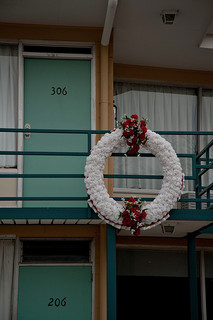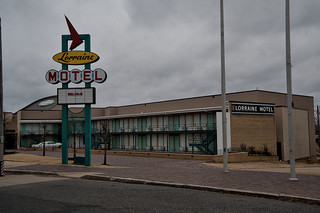“Let us develop a kind of dangerous unselfishness.” –Dr. Martin Luther King Jr.
Recently I was in Memphis and visited the place where Dr. Martin Luther King Jr. was assassinated. If you’re ever in Memphis, go. It’s a powerful experience.
King was in Memphis to lead a demonstration and protest march on behalf of garbage men who had endured years of discrimination, poor working conditions, and appallingly low wages.
The first march took place on March 28, 1968, but some thugs and looters joined the parade, and it ended in violence. Police used their night sticks on some of the protesters, and the whole thing ended in bloody mayhem. King was whisked away in a car for fear of what might happen to him.
But the failed march did not deter Dr. King. He was convinced that a nonviolent protest in Memphis was possible, so he came back a few days later. The day he arrived, April 3, he and his traveling companions learned that a few people had gathered at a church to support the demonstration. King asked his friends to address the folks at church, while he and the others went back to the Lorraine Motel to work on the movement.
When his traveling companions arrived at the church, it was packed to the gills. Realizing the assembled group wanted to see King, they sent for him. That night he did not use notes, and he had not prepared for the speech. He spoke from his heart, and the result was his famous “I’ve Been to the Mountaintop” speech.
 The next day, April 4, organization for the protest continued until evening, when Dr. King and his companions planned to dine with local Memphis pastor, Rev. Samuel “Billy” Kyles. Kyles showed up at the motel to take them to dinner around 5pm. Leaving motel room 306 around 6pm they noticed a number of people in the parking lot below, one of whom was Rev. Jessie Jackson. Dr. King stood on the balcony for a few moments chatting with the people. Kyles turned to walk down the steps, and that’s when the shot rang out.
The next day, April 4, organization for the protest continued until evening, when Dr. King and his companions planned to dine with local Memphis pastor, Rev. Samuel “Billy” Kyles. Kyles showed up at the motel to take them to dinner around 5pm. Leaving motel room 306 around 6pm they noticed a number of people in the parking lot below, one of whom was Rev. Jessie Jackson. Dr. King stood on the balcony for a few moments chatting with the people. Kyles turned to walk down the steps, and that’s when the shot rang out.
Dr. King died instantly.
On April 8, Dr. King’s friends led a nonviolent march in Memphis with 42,000 participants.
Let me close this post with a few thoughts that have stayed with me since visiting Memphis.
- Dr. King was holding a cigarette when he was killed. The pressure he was under because of his position on Vietnam and because of the Civil Rights Movement got to him, and he took up smoking. It’s also widely accepted that Dr. King engaged in extramarital affairs. The man was flawed, deeply flawed perhaps, yet he accomplished great things.
- While King lay slain on the balcony, Billy Kyles reached into King’s inside coat pocket and quietly made a pack of cigarettes disappear. King never wanted children to see him smoking, which is to say he wasn’t entirely at ease with it. Kyles had his back. We all need friends—friends who have our back.
- The night before he died, in that famous speech, Dr. King said, “Like anybody, I would like to live a long life. Longevity has its place. But I’m not concerned about that now. I just want to do God’s will. And He’s allowed me to go up to the mountain. And I’ve looked over. And I’ve seen the Promised Land. I may not get there with you. But I want you to know tonight, that we, as a people, will get to the promised land!” He told his friends he would never make 40; he died at 39. Dr. King knew that death was a very real possibility, yet he kept on with his mission. I can’t help asking, What’s my mission? What am I willing to die for?
Today I’m grateful for a flawed man who stopped at nothing to pursue a selfless mission. May his example inspire us.


Loved the poignancy of your thoughts, Chad.
It is a lovely reflection, Chad, and helps us to know you in a more well-rounded way. I look forward to these ones!
Thanks, all, for your comments. I know people look to me for writing/publishing advice, but every now and then I feel compelled to let one out like this.
Great post, Chad.
A dangerous unselfishness, I very much love that. Throughout the Bible and history deeply flawed people moved with such courage. I feel that sometimes, I long to serve the God that offers me grace each day.
Thank for the perspective and the encouragements. Those 3 things are true for each of us -even today.
It is so convicting to try to answer the question of what I would be willing to die for. Try is the operative word there – I’m not sure I have an actual answer. The passion and faith someone has to have to lead as Dr. King did is truly inspiring.
I loved seeing the pictures of these humble places that intersected with such important history. Thank you for sharing.